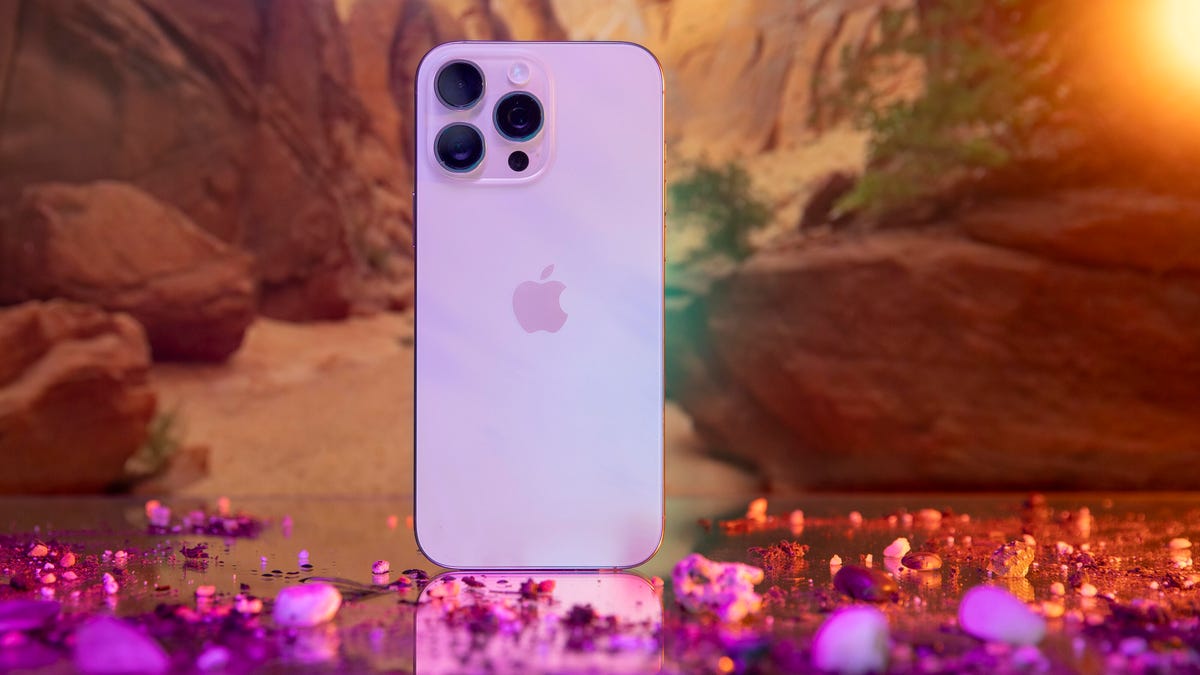As the AI Era Unfolds, Apple Is Walking a Tightrope Like Never Before

Apple is one of a handful of companies that has achieved true, lasting dominance in the tech world. It’s become a fixture of 21st century life and even a tech superpower.
Getting to the top is one thing, staying there is another. Apple’s proven adept at that, dating back at least to the launch of the iPhone 17 years ago. Even when it’s been late to a product category – smartwatches, for example – it’s found a way to offer something unique that helps it become the market leader.
But now Apple’s having a bit of a moment, and not the kind it might wish for. It’s facing a potent mix of perils: regulatory challenges that pose threats to the security of its operating system; lackluster initial sales of its newest iPhones, which arrived without competitive AI features on board; and a dearth of scene-stealing new products. And while Apple might have a long-term vision for how things will eventually play out, in the here and now, the situation looks less than ideal.
Maybe not since the late ’90s, when a struggling Apple brought back wunderkind Steve Jobs, has the company faced so many challenges at once.
The advent of generative AI may be one of the most significant, with the potential to create the biggest shakeup this market has witnessed in almost 20 years, and Apple needs to make a strong showing. Google and Samsung have been working together all this year to give users AI features like Circle to Search and have reiterated time and again that they believe that the best AI will come as a result of collaboration.
Apple, famous for going its own way, knows this too – it’s struck up its own partnership with ChatGPT maker OpenAI. But its first, limited Apple Intelligence features likely won’t be available on mobile until later this month, and only then as part of a long, slow rollout, making it hard to gauge how well it will compete.
The company promised Apple Intelligence would be here “in the fall” and it looks like it will make good on that promise, but it arguably would’ve had a bigger impact if it had arrived ready to go on the new iPhone last month. It feels like a rare moment of Apple being off its game and leaves a question mark hovering over the iPhone 16 series for now – which perhaps accounts for what Apple analyst Ming-chi Kuo identified last month as a slow start to iPhone presales.
Meanwhile, governments are bearing down on the company. In the EU, Apple has been designated a tech industry “gatekeeper” (meaning that it controls access to consumers due to its size and ubiquity) under newly enforceable Digital Markets Act, and regulators are wielding laws that came into effect earlier this year to rein in its power.
New product categories are presenting challenges too. Apple had to shelve its long-running car project, and orders for its expensive mixed reality headset, the Vision Pro, have been underwhelming.
And as Bloomberg’s Mark Gurman points out, many of Apple’s senior executives who’ve guided the company through its most profitable years, during which it became a trillion-dollar company, are approaching retirement age. At some point, there’s going to be a changing of the guard, the kind of thing that can make employees and investors nervous as they ponder future strategy and product offerings.
Cautionary tales abound. Nokia and BlackBerry, once the leaders in mobile phones, didn’t adapt well to changing times. So far, to be sure, Apple has remained not just relevant but dominant in the smartphone market. But it’s hard to escape the feeling that Apple’s in a more precarious position than it has been in a long time.
Who will blink first?
Regulatory hurdles spring up everywhere, but nowhere more so than in Europe. European consumers are already feeling the sting of this: Apple had no choice but to delay the launch of Apple Intelligence on mobile in the region (although it is available on MacOS Sequoia 15.1), as well as iPhone Mirroring and SharePlay Screen Sharing, citing “regulatory uncertainties brought about by the Digital Markets Act.”
“Specifically, we are concerned that the interoperability requirements of the DMA could force us to compromise the integrity of our products in ways that risk user privacy and data security,” the company said in a statement in June. It added that it remains committed to working with the EU to finding solutions that will allow European customers to enjoy its latest, greatest features without compromising their security.
Then in early September, the European Commission demanded Apple do more to open up the iPhone’s operating system, iOS, along with its sibling iPadOS. It’s already had to open up payment options for apps due to EU demands, but opening up iOS would be a much bigger deal.
Not only is iOS Apple’s bread and butter, the iPhone’s defining differentiator, it’s the thing that keeps Apple devices so secure. Apple’s walled garden operating system and developer rules provide a higher level of privacy and security to iPhone and iPad users, which is one of the major benefits of buying into the company’s ecosystem.
“[It] will continue to be paramount for Apple to make sure that everything the user does on their Apple devices is totally secure and private,” said Francisco Jeronimo, chief analyst at IDC, “because the moment they lose this … it will put a big threat to the business.”
To be sure, the EU’s rules could prove unpopular with consumers if they’re denied access to services, potentially backfiring on the Commission, analysts say. Even if Apple is forced to open up its operating system, the consistently high quality of the company’s homegrown services may see it through, Jeronimo said.
“If I want to use an iPhone or any other Apple device, and I like the experience and I like their services, I will not use any other payment system if I have Apple Pay on my phone,” he said.
The bigger threat may be the technical challenge to the company in terms of complying with the EU demands while upholding its high privacy and security standards, he added. “If they cannot guarantee the security of their services, I think they will say, we will not launch it in Europe,” he said.
It’s possible this could escalate into a standoff between Apple and the EU. The question will be, said Ben Wood, chief analyst at CCS Insight, who will blink first?
“Will the EU feel under pressure from frustrated consumers who are annoyed they are missing out on the latest features,” he asked, “or will Apple find people are not buying its latest products and as a result have to make concessions?”
Apple’s spreading roots
Any company with mature product lines is always looking for its next big thing. Right now, Apple doesn’t have that.
The now defunct car project might be the most high-profile enterprise the company has ever scrapped. It was a big-budget, long-term effort that could have redefined Apple. The decision to give it the ax couldn’t have been an easy one, and it now leaves a gap where Apple’s next big thing should be.
Could a robot fill that void? According to the latest rumors, Apple is considering launching a home robot device in 2026 or 2027 – something along the lines of an iPad on a robotic swivel arm, followed sometime later by a more mobile robot akin to Amazon’s Astro. It would be interesting to see if Apple could make a success of it where others have largely failed.
Keep in mind that Apple’s push into smart speakers has not been a resounding success and is one of the few product categories in which it’s failed to become the market leader. Plus, a robot project that’s several years away from delivery doesn’t give people much to be excited about in the short term.
Then there’s the $3,500 Vision Pro mixed reality headset, although Jeronimo believes the reports of its failure have been greatly exaggerated. What the company has achieved with the device is “remarkable,” he said. And while Apple isn’t selling as many VR/AR devices as Meta is with the Quest, it’s managed to generate as much in revenues as Meta has when you compare headset sales, according to IDC’s figures.
“The question around the Vision Pro is not whether they will sell in the millions or not, because that’s not going to happen,” Jeronimo said. Instead, the question is whether Apple can push a compelling message around content and features – in the same way that it did with health and the Apple Watch – that will make it the gold standard that everyone turns to when they need a mixed reality device.
Still, with Meta ramping up competition in the AR space, unveiling its Orion Glasses last month, and with an updated Vision Pro not due until June 2026, according to Bloomberg, Apple better get its skates on if it’s to remain competitive in the mixed reality game.
Meanwhile, Apple continues to tinker with its more established product lines. In its updates to the Apple Watch and AirPods last month, the company emphasized health features: the FDA-cleared sleep apnea detection tool and the FDA-approved hearing loss test, respectively. Analysts agree that pushing more into health is a wise strategy for Apple in the long run and should help it weather the current moment of uncertainty.
“Pursuing the health segment will reap its rewards over time,” said Carolina Milanesi, principal analyst at Creative Strategies.
Can Apple achieve the same kind of success in the professional health care field with wearables as it has in education with the iPad? It’s not just about putting more monitors and sensors in the devices, Jeronimo said. “It’s all about the services and intelligence from collecting all that data.”
The iPhone’s bounce-back potential
Not everyone is pessimistic about Apple’s immediate future. Early iPhone 16 sales figures may be lower than expected, but that doesn’t mean they’ll stay down. Previous early sales figures haven’t always been indicative of the iPhone’s success, and until Apple announces its results for the final quarter of this year we won’t have a full understanding of how it’s performed.
Apple is walking a thin line, but analysts think that once Apple Intelligence lands on iPhones in the coming months, it may nudge people to upgrade. And there are lots of iPhone users out there ready to upgrade – 300 million of them, according to Dan Ives, tech analyst at Wedbush Securities. Speaking with Bloomberg, Ives predicted that this year Apple will see an “AI-driven supercycle” in which more people will buy the new iPhone than in the past few years.
“People who own an iPhone are unlikely to upgrade to anything else,” Wood said. Not only are they likely to splash out on a new model either now or at some point in the near future, but in the meantime they’re providing ongoing services revenue to Apple, he added.
Research from CCS Insight suggests that when people are upgrading their phones, they’re choosing a more premium model. This could be good for Apple, which even at its cheapest is a premium brand.
The iPhone 16 launch has come and gone, but the market still seems to be holding its breath ahead of the launch of Apple Intelligence. If Apple gets it right, it has a lot to gain.
“Apple Intelligence offers Apple a long-tail opportunity to drive engagement and increase loyalty and satisfaction even further than they have so far,” Milanesi said. It also presents more reasons for people to buy into Apple’s ever-expanding paid services ecosystem, which includes Apple Music, Apple Arcade and Apple TV Plus – another big investment for company.
In CNET’s reviews, our experts gave the iPhone 16 and iPhone 16 Pro scores of 9 and 9.2 out of 10, respectively. This is before Apple Intelligence lands on the phones, meaning that even without the AI bonus features, we think these are some of the best phones money can buy. As Senior Editor Lisa Eadicicco wrote in her review of the iPhone 16, “we still have yet to see how big of a leap forward the iPhone 16 truly is.”
Much to prove
The stakes are high for Apple this year, and the company has felt the pinch, having joined other tech giants in announcing rare rounds of layoffs. Its main asset right now is that its products and services are well loved by its loyal customer base, but that doesn’t mean it can afford to rest on its laurels.
In this moment and in the immediate future, it’s got some work to do. The iPhone supercycle that’s been predicted for this year is yet to materialize and Apple Intelligence has much to prove.
In Europe, Apple is unlikely to go down without a fight, but that fight will probably be lengthy and expensive – in spite of Apple’s wishes. “Our objective is to move as fast as we can, obviously, because our objective is always to get features out there for everyone,” said Tim Cook on Apple’s August earnings call. A win for European consumers would look like access to Apple’s full range of services, as well as the ability to make choices about what best tech serves them, all with their privacy and security intact. It’s a tightrope walk, and Apple’s barely taken its first step.
As for moonshots, the promise of a robotic iPad with better speakers that can swivel around our kitchens isn’t necessarily going to keep people on the edge of their seats for the next two years. The company is always working on secret projects behind the scenes, but many never see the light of day.
And so we wait to see what magic Apple has up its sleeve. The company’s future success hangs on the investments it’s made today, paired with strong ongoing leadership, paying off – starting with the arrival of Apple Intelligence later this month. For now, we’re holding our breath.




